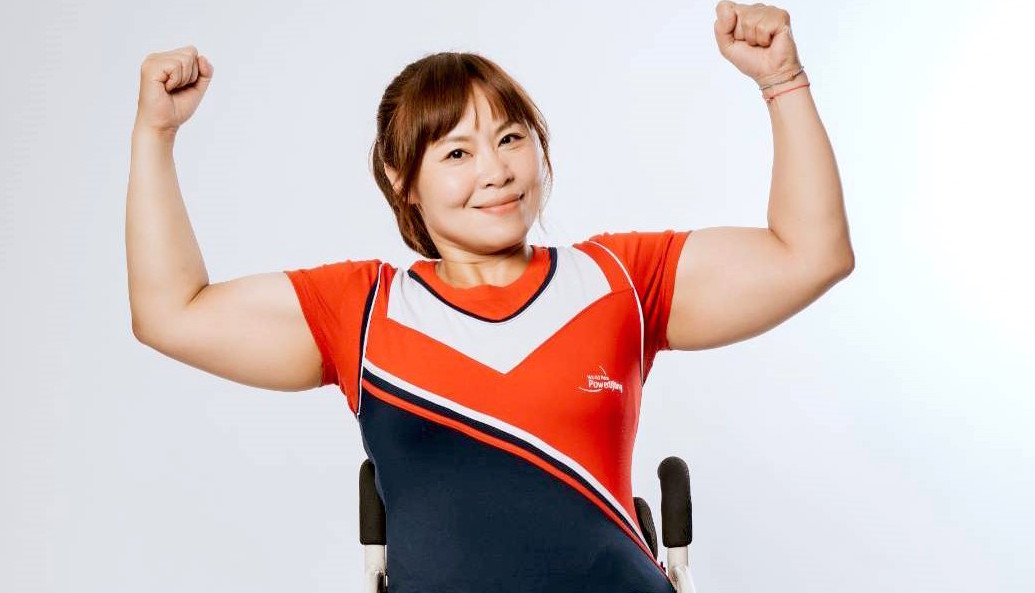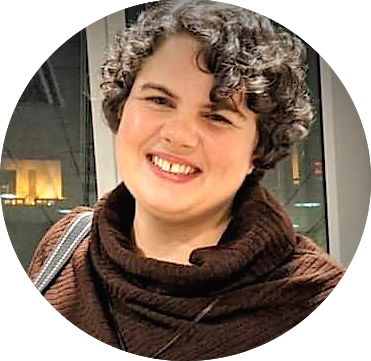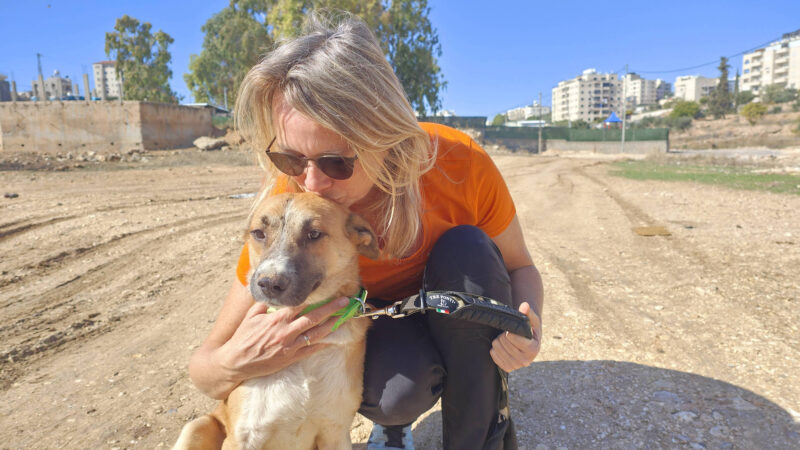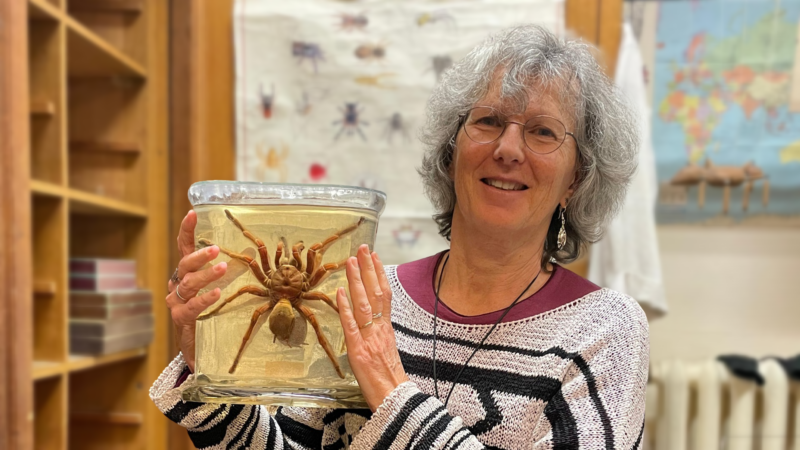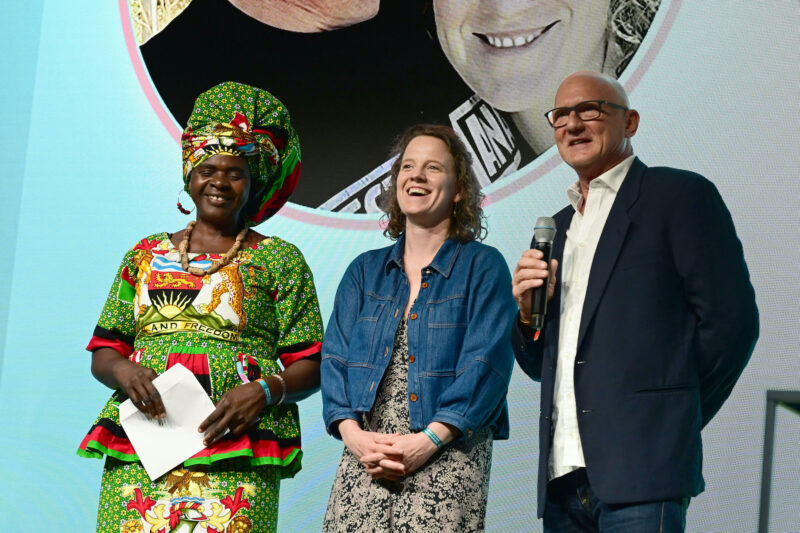Lin Ya-hsuan has been competing in international para competitions for 20 years. Her career began at a time when disability sports were hardly promoted in Taiwan. Today, the athlete enjoys increasing attention and tells her story at schools and universities.
By Carina Rother, Taipei
Lin Ya-hsuan* is training, as she does almost every day. The petite woman with the broad shoulders gets into position on a black couch. She fixes her slender legs with a strap, a second, wide strap she fastens tightly around her waist for stability. Next to the bench is her wheelchair.
In a small training centre in the western Taiwanese megacity of Taichung, the weightlifter is preparing for the next competition. It will be her sixth World Cup. Lin has just returned from Tokyo, her sixth Paralympics. There she lifted 78 kilos; seventh place in her weight class.
The sport is a way for her to prove herself and to see the world, says the 45-year-old. She doesn’t care that so-called “powerlifting” is still considered unfeminine: “People say you get strong arms from it. But I depend on the strength of my arms. For me it has advantages. You also notice at the competitions that female weightlifters are particularly confident – just cool.”
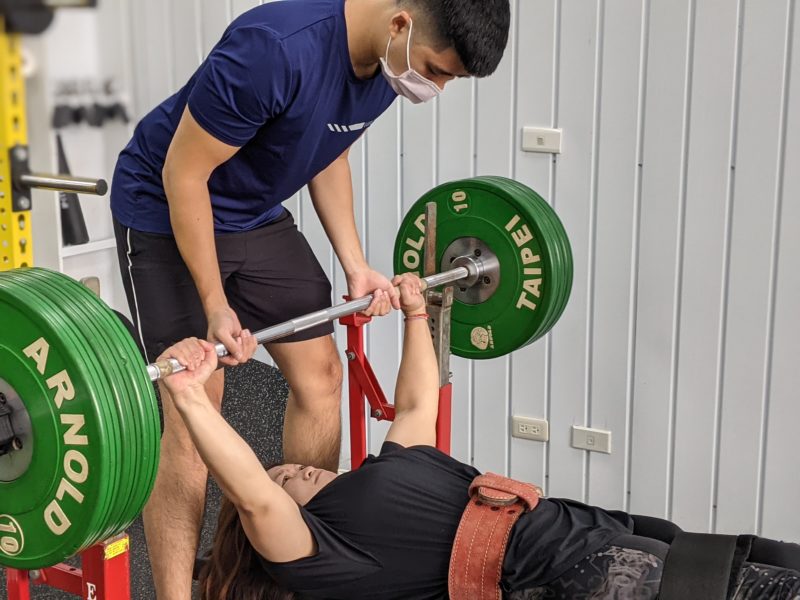
The athlete slides under her barbell. Behind her is coach Eddie Chang, who attaches one 20-kilo plate after the other to the bar. He is impressed by Lin’s motivation: “She has a strong will, which really shows during training. She perseveres, even when it’s unpleasant at times.” The fact that she can now prepare for competitions with special training and a one-year scholarship was not a matter of course for a long time.
“When I was at my first Paralympics in Sydney in 2000, Japan already did live coverage from on site. At that time, we wished that one day Taiwan would have that too.” Her wish was not to come true until 2021. Until then, there were many years in which the athlete financed her preparation for the competition herself; only for the three months leading up to departure there was an option for a scholarship. The equipment of the Paralympians was also worse than that of the non-disabled athletes.
Not giving up despite unequal chances
She complained to Taiwan’s Olympic Committee: “It wasn’t about the items for us, it was about the fact that we wanted to be treated equally. We may be in wheelchairs, but we are still athletes.“ Many of her fellow athletes had to give up due to lack of funds: “If reality and dreams cannot be reconciled, you will always choose reality.” But Lin Ya-hsuan has a fighting spirit. Even as a schoolgirl, she has been travelling several hours a day to a training centre that was tailored to her needs.
Later, she financed her competition preparation through full-time work. Only in the past two years, says Lin, have the circumstances for professional athletes with a disability in Taiwan clearly improved: “Since the 2018 Asian Games, the appreciation has increased noticeably. There has been some restructuring in the Olympic Committee, and the sports department of the Ministry of Education is also more aware of us. Our standard is slowly being aligned with that of the Olympians.“ This is also urgently necessary if Taiwan wants to keep up; the athlete has noticed for years at international competitions that disabled sports have long since become a professional business in other countries.
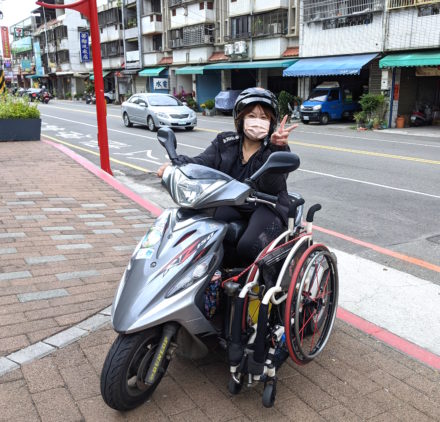
At the training centre in Taichung, her coach gives the starting signal. Lin lifts the heavy bar from its holder, lowers it over her chest and lifts it upwards. First 70 kilos, then 80. In training, she even lifts 90 to overcome her fear of the heavy weights. Nevertheless, it has never been enough for the Paralympic podium. The main reason: the grouping in Para competitions. Most disciplines are divided according to the degree of disability.
When she fell from the fourth floor at the age of three and irreparably injured her spine, her fate seemed sealed in the conservative Taiwan of the 1980s: “As a child, I thought I had to spend my whole life at home. The social environment back then, the public transport – nothing was designed for us. “
No prospect of winning a medal
She comes from a humble background, after leaving school got a job – first in a publishing house, then in a factory. The warm, outgoing woman had a hard time in the working world at first: “I lacked self-confidence because the difference was so visible and I couldn’t do a lot of things. It went so far that I refused when female colleagues wanted to go out with me because I didn’t want to inconvenience them.”
“But I have a rebellious heart. Inwardly, I always thought this couldn’t be all. “Her greatest wish: a trip abroad. But no tour operator wanted to take her, even though she had the money saved for it – too inconvenient, they said. Finally, she found a flexible office job and could concentrate on her training on the side. The weightlifter qualified for the World Wheelchair Games in New Zealand in 1999 and has been competing worldwide several times a year ever since. So finally, sport became her ticket to see the world.

Training is over. The athlete swings herself from her wheelchair onto the scooter waiting for her outside the door – the most common means of transport in Taiwan. Her scooter is adapted for disabled people, with two rear wheels and a wheelchair holder next to the steering wheel. Her own mobility is her key to freedom. In general, a lot has changed in Taiwan: “Eight out of ten buildings now have entrances for the disabled. No matter where you go, there is a disabled parking space everywhere.”
She whizzes through the streets on her way to her next appointment. A middle school has invited her to talk about her life. For seven years, Lin has been taking her story to schools and universities, businesses and clubs. Her message: never give up. For her commitment, she received the Presidential Education Award in 2021. Since then, the requests have become even more numerous.
Today, Chen Yu-jie from the Eden Welfare Foundation organised the talk. The foundation has been cooperating with the motivational speaker for a long time: “She is willing to talk about her personal circumstances. She can talk about these things in a very unagitated way and thus encourages other people to pursue their dreams as well. That is very valuable,” Chen finds.
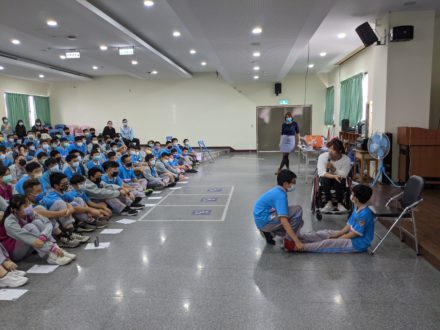
The motivational speaker is delighted when she arrives in the auditorium of the middle school and finds three specially marked spaces for wheelchairs, on the floor in front of the regular seats. Then her audience starts to arrive, about a hundred pubescent boys and girls in blue and pink tracksuits. For two hours they listen animatedly to the lecture of this woman in front of them in a wheelchair, who has been all over the world, competes with the best in her discipline and wants to teach them two things today: courage to persevere and respect.
Respect for people who have different conditions than most. There is great laughter when Lin role-plays for the children what it feels like not to be able to use their own legs. But the aha moment is also palpable in the room, and the admiration. A tenth-grader, herself in the school weightlifting club, sums up: “Very impressive. She had a hard time and still kept going.”
The speaker is happy about the children’s attention. She has a lot to do these days, the requests for lectures, the training for the competitions, and Lin Ya-hsuan has also started a degree in Japanese studies: “Now I only do what gives me pleasure. Then later, when I’m old and can’t move any more, I’ll have lots of nice memories and know that I haven’t wasted my life.”
* Chinese-language names are given here according to the original spelling with “surname first name”.

